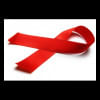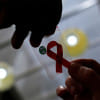Fear of HIV spread grows
Health officials in Cox's Bazar fear spread of HIV/AIDS in the refugee camps as a rising number of Rohingyas have been diagnosed with the disease.
So far, 19 patients, mostly males, have been identified. One of them died since the Rohingya influx began on August 25, according to Cox's Bazar Civil Surgeon office.
More than five lakh Rohingyas have fled violence in Rakhine State of Myanmar into Bangladesh that was already hosting over 3 lakh Rohingyas before the recent influx. The refugees live in congested camps in the country's south-eastern district.
Shaheen Md Abdur Rahman Chowdhury, residential medical officer of Cox's Bazar Sadar Hospital, said 16 AIDS patients had been brought under treatment.
Having seen the number of such patients increasing, the health ministry provided 300 kits to detect HIV patients at the upazila level in Ukhia and Tekhaf, he told The Daily Star. Doctors, nurses, pathologists and technicians are being trained in how to use the kits and safety measures, he added.
According to the UNAIDS, 2.3 lakh people are living with HIV in Myanmar, and 7,800 people died due to the infection. Myanmar is one of the 35 countries witnessing 90 percent of new HIV infections globally.
Preferring not to be named, a gynaecologist working for an international organisation in Ukhia said the actual picture would be dreadful.
“In the field level, we don't have any mechanism to detect HIV patients. We refer those who have symptoms of HIV to the district hospital for confirmation.”
Though the HIV positive patients seem to be low in number, the risk of spreading of the infection is very high, the gynaecologist said, fearing a rapid spread of the contagious disease if steps were not taken immediately.
Health personnel working in the refugee camps said most of the Rohingya people were not covered by vaccination and so their immune system was comparatively weak. Besides, their hygiene practices are not up to the mark, while many of them maintain "risky sexual behaviour".
Misbah Uddin Ahmed, Ukhia Upazila health and family planning officer, said six Rohingya people were identified as HIV positive at his hospital.
“Myanmar is one of the countries in the world where HIV/AIDS is endemic. Rohingyas are not excluded. We never know how many Rohingya people are HIV infected and how many of them entered Bangladesh,” he said.
Ahmed also said HIV tests were being conducted in delivery cases at his health complex.
“We have taken various measures to identify HIV positive patients and vulnerable patients. The situation is still under control,” Abdus Salam, civil surgeon of Cox's Bazar, said.
Abul Kalam Azad, director general of the Directorate General of Health Services, said a team of national HIV programme was already in Cox's Bazar and was working to identify HIV patients.
“We are providing treatment once they are detected....We will not go for mass screening for HIV detection. It is not required. We will screen only those vulnerable to the disease.
According to the health ministry, 4,143 Bangladeshis, one of the lowest in the world, have been found to be HIV-positive so far and 658 patients have died.

 For all latest news, follow The Daily Star's Google News channel.
For all latest news, follow The Daily Star's Google News channel. 








Comments